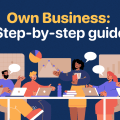
SeedStars Startup Survival Guide: How to Beat Competition and Grow Big
How to beat the competition in today’s economy? Founders and entrepreneurs ask this question all the time. However, there is plenty of other questions to be answered, like how to define the best idea for a startup, how to promote your company, and how to go global. By answering all of them, it gets easier to define how to keep ahead of the competition.
Suresh Patel, SeedStars Summit speaker, and Managing Partner at Iseo Ventures, European-based early-stage technology fund focused on Emerging Europe, tells what it takes to launch a startup and how to run a new business successfully.

Contents
In what ways does the business environment change today? How can startups remain competitive in these changing conditions?
Now, more than ever — in today’s weaker seed investment market, where investors are doing fewer seed deals—startups need to create something people want and make sure their KPI results are sufficiently competitive to take them to the next level.
On the other hand, startups can utilize the improving environment in Emerging Europe’s startup sector. As the regional startup support infrastructure is improving with many new tech hubs and support programs, human capital is improving in quality with more and more international success stories coming out of the region, and people from different geographies are increasingly connected.
The two things startups must consider to beat the competition in the current market situation are:
- Intelligence in other markets. Constantly check you are unique or keep your business sustainable globally.
- Growth focus only. Revenues exceeding €1.0M EUR in the first 12 months stand out for investment.
What marketing trends do you see today?
The trends we notice are mostly caused by technology innovation.
Firstly, we see internet live video becoming an effective marketing channel across a variety of internet platforms: Facebook, Instagram, Twitter or Youtube. We expect marketers to significantly increase their video and live video content production over the next year.
Personalization keeps developing fueled by new AI and big data technologies. Hence, account-based marketing will flourish, by providing custom content to particular account types. Personalization across all stages of the sales funnel will distinguish the winners from the losers.
Furthermore, we see greater integration of digital and offline experience. Brands are able to address audiences before, during and after offline events, which we will see more especially at sports events. At the same time, this is facilitated by digital platforms such as wearable devices, the smart home, smart cars, and even smart urban spaces.
Privacy protection is going to be a value proposition itself due to the increased awareness for cyber fraud and the introduction of the General Data Protection Regulation (GDPR) in 2018. The GDPR will make it more complicated to use cookies for tracking internet behavior. This will lead to employing more contextual and personalized advertising strategies.
What differs a good startup idea from a bad one?
It is safe and easy to say that an idea is nothing without the execution. However, the execution itself can be considered also as an intricately developed idea down to the operational level. So a good idea needs to show a good understanding of the fundamentals of the business, which in turn develop into a huge and attainable vision.
How to use international best practices in marketing campaigns?
The marketing professional needs to have two things in order: tools and process. Innovation in marketing tech is increasing the extent of data integration and process automation. Therefore, the simple advice for the marketer who needs to be on the forefront of this trend is to utilize the best and latest marketing automation software suites, because they also dictate the other key element, the process.
Are there any ways to mitigate possible issues with going global?
Be proactive in taking on industry leadership roles. In the face of changing legislation driven by new technologies such as distributed ledger and AI, we intend to ever increase our involvement in relevant regional and global community organizations that influence conversations about new regulatory frameworks. We encourage the Founders of our portfolio startups to do likewise.
If one is informed, if one has experience in one’s field and related fields (or consults regularly with those that do), if one is decisive, and if one is nimble and quick to act on informed decisions, then amidst the shifts and shudders of regional legislation and regulation—then there are as many opportunities presented by these changes as there are obstacles and risks.
For example, travel and connectivity allow a huge number of variations in service purchasing and acquisition, which are impossible to be fully regulated by existing or even future laws. It is important to do your research on local regulation and taxation.
Some areas that we see as equally challenging and encouraging in this regard are:
- Digital Payments – As payment becomes an increasingly digital domain, innovative solutions such as cross-border ridesharing, cross-border purchasing of services, face complex challenges: tax-related issues, currency conversion, and so on. But again, for a well-informed, super-engaged, nimble competitor, these are also opportunities.
- ERP & accounting
- Data Portability (also applies to new General Data Protection Regulation directive GDPR) & Digital Identity
- Blockchain-based solutions are gaining acceptance across industries, but face a minefield of challenges. Cryptocurrencies face barriers in securities regulation. Smart contracts face a powerful, entrenched legal industry. Application of many more distributed ledger based solutions faces resistance and a learning curve that must be overcome by regional and local authorities.
But again, these challenges also present opportunities for innovation. Take data-portability and digital identity for example. The world is currently dealing with the largest population of displaced people in history. In order to create new roots, or return home in the future to reclaim their citizenship and assets, they need resilient, immutable, portable, accessible solutions for their health records, proof of assets, proof of identity, etc.
How do you get insights from different countries?
The key element is for the founders to travel, followed by hiring culturally and ethnically diverse or internationally experienced talent in your company. And if you intend to develop products or deliver services in other nations, you must be prepared to hire locally, and to engage proactively and respectfully with the local communities you intend to serve—both to best understand their needs and to ensure that your methods are respectful to the local culture.
In doing so, you are more likely to be welcomed as a thoughtful and respectful corporate citizen and community partner. The domain-specific knowledge will glean from such engagement, and the local community’s willingness to collaborate with you will always pay off, both in terms of the quarterly bottom line as well as in your development as a more resilient company.
How can regional and global investors collaborate?
Both groups of investors play a significant role in the regional industry. However, startups must be completely aware of the different profile and characteristic that each brings to the table. For example, global investors will usually look for huge global market opportunities, run by serial entrepreneurs and being at Series A or above. While the regional investors might be interested also in regional market opportunities, run by novice entrepreneurs and at pre-product or MVP stages. In this way, both types of investors can play a suitable role in the lifecycle of a startup.
From a regional industry point of view, the seed gap is the most serious impediment to a healthy deal funnel and thus the performance of venture capital. Obviously, the local and regional investors must play a greater role at the seed stage and fill in the gap. This will at the same time, strengthen their position to partner with global investors and collaboratively create a greater number of significant exits in the region, thus enticing more financial, human and social capital to be invested into a growing industry.



